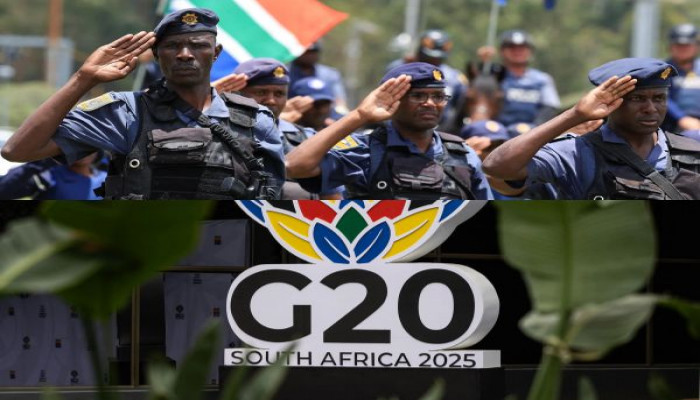South Africa, US in war of words over Trump administration’s boycott of G20 Summit
- In Reports
- 07:35 PM, Nov 22, 2025
- Myind Staff
The dispute between South Africa and the US over the Trump administration’s decision to boycott the G20 summit in Johannesburg has continued, increasing the already strained relations between the two countries. South Africa strongly objected to a US plan to send a junior embassy official to the closing ceremony, which was intended to mark the handover to the next summit in Florida. Many in South Africa viewed this decision as disrespectful and dismissive, adding to frustration about the US approach.
The two-day summit opens on Saturday during a tense period in global politics. The US has put forward a proposal to end Russia’s invasion of Ukraine, which it discussed with Moscow without involving Ukraine or the EU. This move has created confusion and criticism among global partners. Washington has also spent months accusing South Africa of racial discrimination against minority white Afrikaners, who held power during apartheid. South Africa has firmly rejected these accusations and called them unfair.
President Cyril Ramaphosa told reporters on Thursday that the US had changed its position about attending the G20 and that discussions were underway about the form of US participation. Earlier, he had expressed frustration by saying that countries should not be bullied and that their sovereignty must be respected. His comments showed clear irritation with the US stance.
White House press secretary Karoline Leavitt responded sharply. She said, “The US is not participating in official talks at the G20 in South Africa. I saw the South African president running his mouth a little bit against the United States and the president of the United States earlier today, and that language is not appreciated by the president or his team. The ambassador or the representative of the embassy in South Africa is simply there to recognise that the United States will be the host of the G20 [next year]. They are receiving that send-off at the end of that event. They are not there to participate in official talks, despite what the South African president is falsely claiming.”
The US currently does not have an ambassador in Pretoria, with Marc Dillard serving as acting ambassador. This has increased the perception that the US is not fully engaged with South Africa. Many South Africans reacted with anger, seeing the US decision as disrespectful. Foreign ministry spokesperson Chrispin Phiri stated, “President will not be handing over to a junior embassy official.” Ramaphosa had previously said he would hand the G20 presidency to an “empty chair”, although he added that he would have preferred to give it directly to Donald Trump.
The 2026 summit will take place at the Trump National Doral Miami golf resort in Florida, owned by the Trump Organisation, a detail that has sparked attention and criticism. Analysts said the US boycott of the G20 could damage its global image. Political risk consultant Marisa Lourenco said, “China or India in the past might get criticised for certain actions … Now the US is really being seen as the unreasonable one, because it’s becoming clearer and clearer that what it’s doing to South Africa is just completely misguided.”
The G20 was founded in 1999 after the Asian financial crisis as a broader alternative to the G7, bringing together major economies and the EU to find agreement on global economic and financial issues. South Africa has taken pride in being the first African country to lead the G20 and has presented itself as a voice for African priorities. These priorities include addressing high public debt and ensuring that Africa benefits from the rising demand for critical minerals used in green technologies.
South Africa’s agenda also focuses on increasing financing for a “just energy transition” away from fossil fuels while protecting jobs and improving disaster resilience. Ramaphosa commissioned reports on Africa’s high debt levels and global inequality. The inequality report, led by Nobel prize-winning economist Joseph Stiglitz, found that the richest 1 per cent captured 41 per cent of global wealth generated between 2000 and 2024, while the poorest 50 per cent received only 1 per cent.
Panel members recommended creating an independent body to gather data on inequality and evaluate policy effectiveness. The idea was supported by Ramaphosa, Brazil’s president Luiz Inacio Lula da Silva, and Spain’s prime minister Pedro Sanchez in a Financial Times opinion piece.







Comments